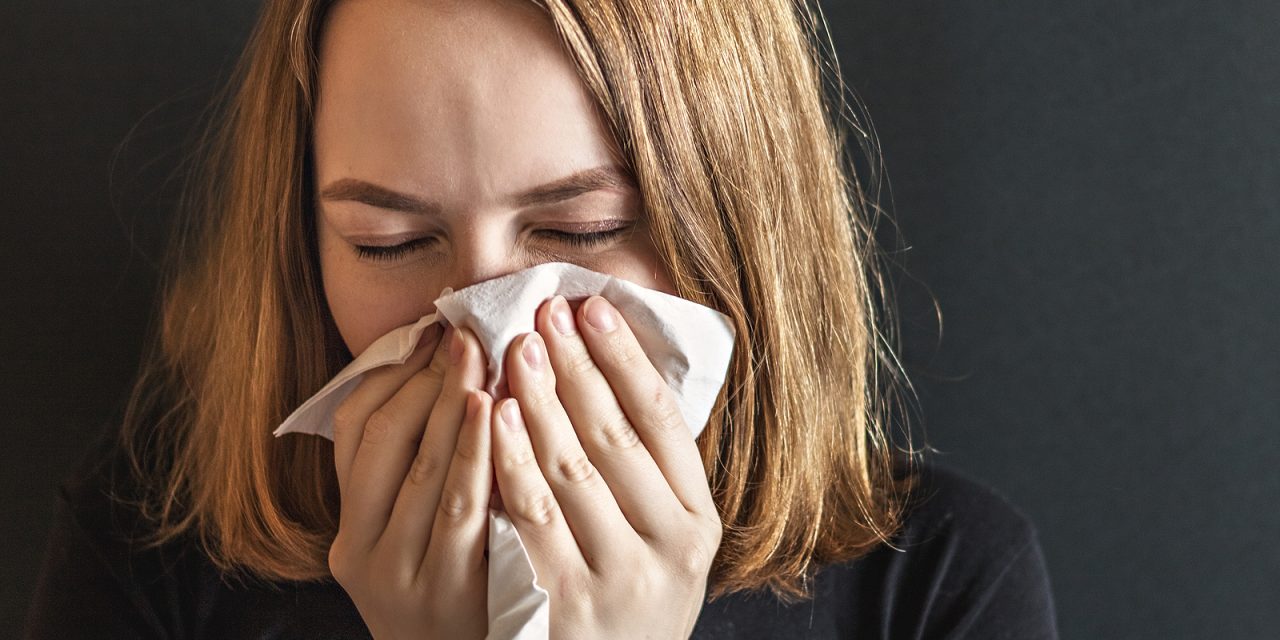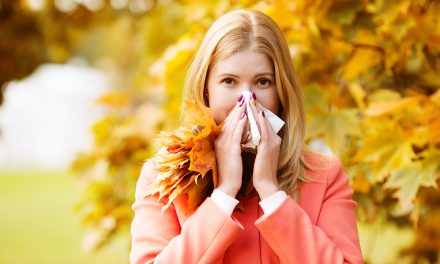Allergies are a common cause of coughing, a symptom that can range from mildly irritating to severely disruptive. A cough caused by allergies is often the body’s reaction to breathing in allergens such as pollen, dust mites, pet dander, or mold spores. When these particles enter the airways, they can trigger the immune system to release histamines and other chemicals, leading to inflammation and the cough reflex.
It is crucial to identify whether a cough is allergy-related, as its persistence can impact daily life and because it requires specific treatment to manage effectively. Differentiating an allergy cough from other types of coughs, like those resulting from a cold or infection, often involves looking for additional symptoms such as sneezing, itchy eyes, or a runny nose. Proper diagnosis and treatment are important to alleviate symptoms and prevent possible complications from untreated chronic coughs.
Key Takeaways
- A cough can be a reaction to airborne allergens triggering the immune system.
- Identifying allergy cough involves additional symptoms beyond the cough itself.
- Effective management of allergy cough requires proper diagnosis and treatment.
Understanding Allergies and Cough
When an individual’s immune system erroneously identifies a typically harmless substance as a threat, it launches an allergic reaction. Common allergens such as pollen, dust, or pet dander can infiltrate the airway, prompting the body to defend itself by releasing chemicals like histamine. This histamine release can cause a variety of symptoms, including a cough.
A cough associated with allergies is often the body’s attempt to expel these allergens from the respiratory passages. It can vary from a mild, irritating dry cough to a persistent one that disrupts daily activities.
Types of Coughs:
- Dry Cough: Usually a result of irritation in the throat or airway.
- Wet Cough: May signal postnasal drip as mucus trickles down the throat.
The causes of an allergy cough can be multifaceted, with different allergens provoking diverse responses in the immune system. The intensity and quality of the cough may provide clues as to the underlying cause.
Allergens that may cause coughing:
- Pollen
- Dust Mites
- Animal Dander
- Mold
It’s important to note that while coughing can be a symptom of allergies, it can also signal other respiratory conditions. Therefore, proper diagnosis and management by a healthcare provider are essential to alleviate discomfort and address any underlying issues.
Identifying Common Allergens
When individuals experience a cough triggered by allergic reactions, several common allergens are typically the culprits. Proper identification of these allergens is crucial for effective management and treatment. This section details these recurring irritants known to provoke coughing.
Pollen: A frequent offender, especially during spring and fall, pollen comes from trees, grasses, and weeds. It can induce an allergy cough that persists in the presence of pollen and subsides when exposure is limited.
Dust Mites: These microscopic organisms thrive in warm, humid environments and are prevalent in household dust. They primarily live in bedding, upholstered furniture, and carpeting, stirring up allergy symptoms, including a cough, when disturbed.
Mold: Found both indoors and outdoors, mold spores can incite allergic reactions when inhaled. Damp areas like bathrooms, kitchens, and basements are typical mold hotspots.
Pet Dander: Proteins found in the skin flakes, urine, and saliva of furry pets can cause an allergic response. Pet dander can be airborne and linger in the environment, making it a common cause of persistent coughs in sensitive individuals.
Dust: Often carrying a conglomerate of multiple allergens, dust can harbor pollen, pet dander, dust mites, and even mold particles, contributing to allergic coughs when inhaled.
Allergen Exposure by Season
| Season | Common Allergens |
|---|---|
| Spring | Tree and grass pollen |
| Summer | Grass pollen, mold |
| Fall | Weed pollen, mold |
| Winter | Dust mites, indoor mold, pet dander |
Individuals with allergies should note their symptoms in relation to their environment to help determine the likely allergens. Reducing exposure to these allergens may alleviate coughing and other related symptoms.
Mechanisms of Allergy-Induced Cough
Understanding allergy-induced cough involves unraveling the body’s immune response to allergens and recognizing coughing as a prevalent symptom. These mechanisms highlight how the throat and airways are affected during an allergic reaction.
Immune Response to Allergens
When the body encounters an allergen, the immune system triggers the production of Immunoglobulin E (IgE). This antibody binds to allergens, prompting specific cells in the body’s tissues and bloodstream to release histamine and other chemicals. The release of these substances leads to inflammation, particularly in the lungs and airways, causing various respiratory symptoms.
Cough as a Symptom
Coughing is the body’s reflexive response to clear the throat and airways of mucus and irritants. During an allergic reaction, this mechanism can manifest as an allergy cough, commonly described as a dry cough without the production of phlegm. However, if mucus production is stimulated, the allergy cough may become more persistent and bothersome as the body attempts to remove the allergens from the respiratory system. The presence of excess mucus can further exacerbate respiratory symptoms, contributing to the discomfort experienced during an allergic response.
Symptoms Associated With Allergic Cough
Common Symptoms
Allergic coughs typically stem from an immune response to inhaled allergens. A dry and persistent nature usually characterizes them. Often, they can manifest alongside other symptoms resulting from allergic reactions. The following are common symptoms associated with an allergic cough:
- Sneezing: Frequent, repetitive sneezing may accompany an allergic cough.
- Runny Nose: A clear nasal discharge is expected as the body tries to expel the allergen.
- Itching: There might be itching in the nose, eyes, or roof of the mouth.
Respiratory Symptoms
Individuals may also experience postnasal drip, which involves excess mucus running down the back of the throat, often provoking a cough reflex to clear it. This can lead to:
- Chest Tightness: Feeling of pressure or discomfort in the chest area.
- Wheezing: A high-pitched whistle-like sound when exhaling.
Intensity and Duration
Allergic coughs are often worse at night or early in the morning and can be exacerbated by specific triggers, such as pet dander, dust, or pollen. Despite being a non-productive cough (not producing mucus), it can be disruptive and persists as long as the exposure to allergens continues.
Note on Treatment
Addressing the underlying allergy, typically through avoidance of known allergens and potential medications, can alleviate the cough. If symptoms persist or worsen, seeking medical advice is imperative.
Please note: The provided information should not substitute professional medical advice, diagnosis, or treatment.
Differential Diagnosis of Cough
When a patient presents with a cough, healthcare providers consider various conditions to diagnose the cause accurately. Allergic rhinitis often triggers a cough due to postnasal drip irritating the throat. This condition is also associated with symptoms like sneezing and a runny nose.
Asthma is another common culprit, characterized by an often chronic cough accompanied by wheezing and shortness of breath. Bronchitis — both acute and chronic forms — results in a cough that produces mucus and is typically associated with an airway infection.
In the context of a pandemic, COVID-19 has become essential to differential diagnosis for cough. The cough in COVID-19 patients tends to be dry and persistent, sometimes progressing to severe respiratory issues. It’s crucial to consider the common cold, which leads to a cough alongside other respiratory symptoms such as congestion and a sore throat.
Fever is not a direct cause of cough but may indicate an underlying infection that could be responsible for respiratory symptoms, necessitating an assessment for either viral or bacterial infections.
It’s important to note that chronic cough lasts longer than eight weeks and may result from longer-standing conditions such as gastroesophageal reflux disease (GERD) or a persistent infection.
Diagnosing the exact cause of a cough involves considering the duration, nature of the cough, associated symptoms, and patient history to narrow down the potential conditions and provide the appropriate treatment.
Allergy Testing and Diagnosis
When someone experiences a cough suspected of being caused by allergies, allergy testing is crucial in pinpointing the exact allergens responsible. Allergists are specialists who can administer and interpret these tests to arrive at a diagnosis.
Skin tests are often the first line of testing due to their speed and accuracy. They involve exposing the skin to small amounts of suspected allergens and observing the skin for signs of an allergic reaction.
- Types of skin tests:
- Prick tests: Introduce allergens through tiny punctures on the skin’s surface.
- Intradermal tests: Inject allergens slightly under the skin.
- Patch tests: Apply allergens to patches that stay on the skin for 48 hours.
Sometimes, a blood test, such as the Immunoglobulin E (IgE) test, may be used. It measures the immune system’s response to specific allergens.
Pros and Cons of Allergy Tests:
- Skin tests:
- Pros: Quick results; sensitivity for detecting allergies.
- Cons: Discomfort; potential for false positives or negatives.
- Blood tests:
- Pros: Useful for those who cannot undergo skin tests.
- Cons: Longer wait time for results; costlier.
After the testing, allergists can provide a detailed plan on managing and treating the identified allergies, which may involve medication, avoidance strategies, or immunotherapy.
Treatment Strategies for Allergy Cough
Effective treatment for an allergy cough revolves around symptom management and long-term strategies to reduce sensitivity to allergens. Below, both medication-based approaches and longer-term management techniques are outlined to provide relief from coughing triggered by allergies.
Medications for Symptom Management
Antihistamines are a cornerstone for addressing the immediate symptoms of allergies, such as coughing. They work by blocking the action of histamine, a substance produced by the immune system during an allergic reaction. Available in various forms like pills and liquids, examples include loratadine and cetirizine. For those with a persistent cough, a steroid nasal spray may be prescribed to reduce inflammation in the nasal passages.
In cases where nasal congestion is prominent, decongestants can provide relief by shrinking swollen tissues in the nasal cavity, though they’re not suitable for long-term use due to potential side-effects. Some medications combine antihistamines and decongestants for a more comprehensive treatment.
Long-Term Allergy Management
Long-term management focuses on altering the immune system’s response to allergens. Allergy shots, also known as immunotherapy, can gradually desensitize the body to specific allergens. This process involves regular injections of small amounts of these substances, with the goal of reducing the severity of the allergy response over time.
Another approach is using sublingual immunotherapy, a method where patients dissolve a tablet containing the allergen under their tongue. This is a newer form of immunotherapy that can be done at home, making it a convenient option for some patients. Regular use of steroid nasal sprays can also help manage chronic symptoms and can be an integral part of long-term allergy treatment plans.
Lifestyle Modifications and Prevention
To mitigate coughing caused by allergies, individuals can make several lifestyle adjustments and employ preventive strategies. Fundamentally, understanding and avoiding allergy triggers is crucial.
Indoor Air Quality:
- An air purifier can significantly reduce airborne allergens such as pollen, dust, and pet dander in one’s living space.
- Maintaining optimal humidity with a humidifier can help, as overly dry air may irritate the airways and exacerbate coughing.
Home Environment:
- Regular cleaning to remove dust and pet hair is advised. Particular attention should be paid to bedding, upholstery, and areas where allergens accumulate.
- Choosing hypoallergenic bedding can further minimize the risk of allergy-induced cough.
| Action | Benefit |
|---|---|
| Frequent dusting | Reduces allergen accumulation |
| Wash bedding | Removes allergens from sleeping areas |
| Air purifier use | Filters out airborne allergens |
Personal Habits:
- Individuals must strive to avoid places with high pollution levels, as pollutants can aggravate allergic reactions.
- For those with allergies, smoking or exposure to secondhand smoke should be strictly avoided as it can worsen respiratory symptoms, including coughing.
In summary, by implementing avoidance tactics, improving air quality, and adopting healthy habits, people with allergies can significantly decrease incidents of allergy-induced cough. Maintaining these practices year-round can provide ongoing relief and a healthier living environment.
Complications of Untreated Allergy Cough
When an allergy cough is not addressed, it can lead to several complications that impact the respiratory tract. The persistent coughing is often the body’s response to the presence of an allergen and typically involves inflammation of the airways.
Chronic Inflammation: Without proper treatment, the ongoing inflammation can cause damage. Over time, the delicate tissues of the respiratory tract become more susceptible to other problems.
- Sinus Infections: The same postnasal drip that irritates the throat can fill the sinus cavities, leading to infection.
- Chronic Bronchitis: Repeated irritation can cause the bronchial tubes to become inflamed, resulting in chronic bronchitis.
Secondary Infections: The body’s immune response to allergens can weaken its defenses against other pathogens, making the individual more prone to infections.
- Upper Respiratory Infections: Frequent coughing can compromise the upper respiratory tract’s ability to block infectious agents.
- Lower Respiratory Infections: Prolonged inflammation may allow for infections to descend deeper into the lower respiratory system.
An allergy cough might seem innocuous at first, but without treatment, the risk of more serious complications increases. Recognizing and managing an allergy cough promptly can help prevent the development of these more severe conditions.
When to Consult a Healthcare Provider
Allergies can lead to a persistent cough that can impede daily activities. Some scenarios necessitate immediate attention from a healthcare provider. Here are guidelines to determine when professional medical advice is essential:
- Persistent Cough
If the cough lingers for more than three weeks, it demands evaluation to rule out underlying conditions and discuss potential treatment. - Symptoms Worsen
A healthcare provider should be consulted if the cough intensifies or fails to respond to over-the-counter remedies and antihistamines. - Disrupted Daily Life
When a cough is severe enough to disrupt sleep or interfere with work or school, seeking medical advice is crucial for appropriate relief. - Breathing Difficulties
Difficulty or trouble breathing, wheezing, or a feeling of tightness in the chest could indicate a severe allergic reaction or asthma. Immediate attention is required. - Signs of Anaphylaxis
Swift action is required if symptoms of anaphylaxis such as swelling of the face, lips, tongue, or throat, hives, or a sudden drop in blood pressure appear.
Remember, while allergies are often manageable, any cough that causes concern warrants a consultation with a healthcare professional. They can provide a thorough assessment and tailor a treatment plan for the patient’s specific needs.
Emerging Treatments and Research
Recent advancements in allergy research have led to innovative approaches in the treatment of coughs induced by allergies. Clinical trials are essential in evaluating the efficacy of new medications and therapies. Treatments are becoming more targeted, focusing on specific pathways involved in the allergic response.
- Biologic Therapies: These therapies target specific components of the immune system. For example, monoclonal antibodies that inhibit immunoglobulin E (IgE), a key player in allergic reactions, have shown promise in reducing allergy symptoms, including cough.
- Bronchodilators and Steroids: There’s an ongoing investigation into the optimization and combination of existing bronchodilators and inhaled corticosteroids to improve airway inflammation and reduce cough frequency.
- Leukotriene Modifiers: Researchers are working on advancing the use of leukotriene modifiers, which block chemicals that cause swelling and mucus production in the airways, to provide relief from allergic cough.
Table 1: Innovative Allergy Treatments Under Investigation
| Treatment Type | Purpose | Status |
|---|---|---|
| Monoclonal Antibodies | Target and neutralize IgE to reduce allergic reaction | In clinical trials |
| Combined Inhalers | Reduce airway inflammation and control symptoms | New formulations being tested |
| Leukotriene Modifiers | Block swelling and mucus in airways | Enhancing effectiveness |
It’s essential to note that while these developments are promising, they must pass rigorous regulatory scrutiny to become widely available. Allergy sufferers should consult healthcare professionals to understand the potential and limitations of emerging treatments. With ongoing research, the future for managing allergy-induced cough looks hopeful.
Frequently Asked Questions
Allergies can lead to a distinctive cough characterized by particular symptoms and triggers. Understanding these coughs helps in distinguishing them from other types and effectively treating them.
How can you differentiate between an allergic cough and a cough caused by COVID-19?
An allergic cough is typically associated with an itchy throat, watery eyes, and sneezing, and does not result in a fever. In contrast, a cough caused by COVID-19 may be accompanied by fever, body aches, and breathing difficulties.
What are the signs that a cough is related to allergies?
Signs that a cough is related to allergies include persistence without signs of infection, a tickling sensation in the throat, and the presence of other allergy symptoms like a runny nose, itchy eyes, or sinus pressure.
What treatments are available for coughs triggered by allergies?
Treatments for coughs triggered by allergies include antihistamines, decongestants, and nasal corticosteroids. Allergy shots or immunotherapy may also be recommended for long-term relief.
Can allergies cause you to cough up mucus, and how does it present?
Yes, allergies can cause postnasal drip, leading one to cough up mucus. The mucus is typically clear and thin, as opposed to the thick, yellow, or green mucus that can accompany an infection.
What are the effective ways to manage nightly coughs resulting from allergies?
To manage nightly coughs resulting from allergies, one should keep their sleeping area free of allergens, use air purifiers, maintain a slightly elevated head position while sleeping, and consider using nasal sprays before bedtime.
Which medications are considered most effective for treating an allergy-related cough?
Antihistamines and nasal steroids are often considered the most effective medications for treating an allergy-related cough. They reduce the immune system’s response to allergens and alleviate inflammation in the nasal passages.





















